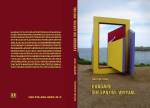It was a real pleasure for me to have had the opportunity to meet George Roca. We launched his book Evadare din spatiul virtual in Madrid (Spain) at Espacio Niram on Saturday, the 26th. The book is divided into seven parts and George Roca read his poems one by one during the event, while Fabianni Belemuski translated them directly to the Spanish audience. Indeed, the night before the event, Mr. Roca and I could exchange views, having a very pleasant talk about different things like the difficulty that exists to learn other languages in countries like Spain or the impossibility to translate poetic words when the author is the only person who knows the authentic meaning, the real feeling of the poem. Why did we talk about this? Because I knew then that today I would be writing about him and his poems and I would come across these two problems that I mentioned a couple of lines above. Anyway, the same night, we talked about poetry, too. Mihai Eminescu was an important point in our conversation, but at the same time the philosophy of Emil M. Cioran or Mircea Eliade and Brancusi’s works were an important part of our reflections. Why? Firstly, because George Roca was born in Romania and currently lives in Australia, but he carries in his heart the homeland in which he saw the daylight for the first time. Secondly, Eminescu is a very important poet in Romania and the three other personalities mentioned above have gained international relevance together with Eugene Ionesco or Tristan Tzara.
In fact, Eminescu and several other big names in sports, music, art, which Romania gave to the world, all have a dedicated poem in the fourth part of book entitled Amintiri. The poem is called Eminescu, and George Roca is singing to a new dawn of Romania in it. This new dawn is because of the fact that…:
Într-o dimineaţa
Dumnezeu
s-a sculat vesel şi binedispus!
A închis vântul în cămară,
a alungat norii
a scos din priză fulgerele,
a oprit cutremurele şi valurile
şi a stins focul su cazanele vulcanilor!.(One morning,/God woke up happy and good-humoured/He locked the wind up in the storeroom,/chased away the clouds,/unplugged the lightnings,/put a stop to the earthquakes and the waves/And he put out the fire of the volcanic caldrons!)
Romania is present across all the pages and the verses from Evadare din spatiul virtual , but it has a reserved space in the second part of book called Antipozi whose content has strong feelings of nostalgia.
George Roca considers himself a journalist rather than a poet. But on Saturday, we enjoyed his facet as a poet, a very chromatic and vital poet with a great sense of humour and great sensitivity. It’s possible to see this colourful vision in the third part of the book called Cromatică australiană and in poems like Galben, which was born as a result of Roca’s son challenging him to write about a yellow cat. Other verses are crossed by the green, red, but especially blue, colours. The blue colour is very significant: it refers, for example, to the depth of the oceans, to the sky above us, or to the special blue similar to Lapiz Lazuli which only exists in a Monastery of Moldavia. This colour connects us with an infinite thought. For this reason, it is not by accident that the stars and the universe appear in other lines, like an elevation path from the sky to the outer space. When can we see the stars? At night. When can we imagine the Universe? At night, too. The night and the sky become magical and special: the diurnal blue sky demonstrates to us that we are alive and we should be happy about it, as in Mă bucur, in the fourth part of book:
În fiecare dimineată
când mă trezesc, mă bucur
mă bucur că e soare
mă bucur că e înnorat
mă bucur că trăiesc(Every morning/When I wake up, I’m happy!/I’m happy that it’s sunny,/I’m happy that it’s cloudy,/I’m happy that I’m alive!)
With the nocturnal black sky we understand that we are part of a larger whole, or that we can dream. But, where can we find the stars? Not in the sky, but in the grass, George Roca answers in one of my favourite poems called Micul Univers:
Seara
căutam prin iarbă
stele căzătoare!(At night,/we searched the grass/for falling stars!)
The stars fall down from the Universe into our human world and into our quotidian lives. In Micul Univers we discover kids playing football with planets as a ball, or riding comets, because George Roca is inviting us to remember our childhood Universe using surrealistic elements.
The sense of humour appears in various poems –especially in the last part of book entitled Fabule şi parodii-, but I like one poem in particular, called Poemul. Poetry is defined as an unfaithful wife who comes to us when we are sleeping, or, if we are awake, when we don’t have pen and paper at her arrival. Poetry is viewed as a woman playing with us as if we were lovers. Thus, poetry is described in terms of an unexpected difficult love, which is not controlled by us because we are its tools.
The previous paragraph helps me point out that there is another important theme within the book: the theme of love, above all in one poem, Sărutul, in which I found a personal symbol which impressed me a lot. Please, read it:
Când am început să te sărut
gura ta avea gustul fructului pasiunii
Totul era atât de activ şi real
De parcă doi îngeri
făceau dragoste pe limba mea.(When I began to kiss you/your mouth tastes like the fruits of passion./Everything was so lively, so real,/as if two angels/were making love on my tongue.)
After reading it, I would want to feel these “two angels making love on my tongue”. It’s not the feeling of a kiss; it’s the feeling of a kiss of love given by a man who is in love. There are many differences between these two kinds of kiss and I think that only a great poet, like George Roca, can express the differences of intensity with these few poetic words.
George Roca’s poetry shows a positive message: we must live in harmony with ourselves and everything around us, in order to get to know who we are and to win the fight against the irreversible time in which we live and to love each other. He is proposing us to escape and to live, to be free from the chains that we have created for ourselves. I have not seen poetry like this in years, encouraging us to discover life as a gift and not as an obligation and a punishment.
Héctor Martínez
Texto revisado y corregido: Eva Defeses



13 comentarios